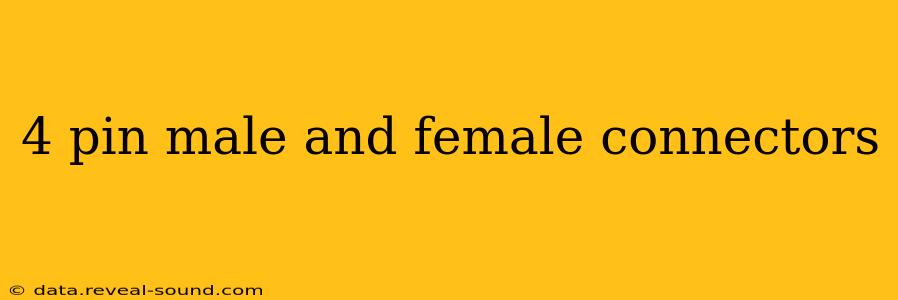4-pin male and female connectors are ubiquitous in various applications, from electronics and robotics to automotive and industrial control systems. Understanding their types, applications, and specifications is crucial for anyone working with these components. This guide delves into the world of 4-pin connectors, offering a comprehensive overview for both beginners and experienced professionals.
What are 4-Pin Male and Female Connectors?
4-pin connectors, as the name suggests, are electrical connectors with four pins or terminals. The male connector has protruding pins, while the female connector has corresponding sockets or receptacles to receive these pins. This simple design allows for a secure and reliable connection between two circuits or devices. The specific type of connector will influence its application, durability, and ease of use.
Different Types of 4-Pin Connectors
Several types of 4-pin connectors exist, each designed for specific needs and environments. These include:
- XH2.54 Connectors: These are commonly used in prototyping and hobbyist electronics, characterized by their 2.54mm (0.1 inch) pitch. They are readily available and inexpensive.
- JST Connectors: JST offers a wide range of 4-pin connectors, known for their small size, reliability, and suitability for various applications, including consumer electronics and robotics. Different JST series (like XH, PH, etc.) cater to different needs in terms of size and current carrying capacity.
- Molex Connectors: Molex connectors are often used in higher-power applications, offering robust construction and higher current carrying capacity compared to some other types. They are popular in automotive and industrial settings.
- Wire-to-Wire Connectors: These connectors are designed to connect wires directly, often used in simpler applications where ease of assembly is prioritized.
- Board-to-Board Connectors: These connectors are designed for connecting printed circuit boards (PCBs), offering a stable and reliable connection in higher density applications.
- Waterproof Connectors: Designed to resist water and other environmental factors, these are essential in outdoor or harsh environments.
Common Applications of 4-Pin Connectors
The versatility of 4-pin connectors makes them suitable for a wide range of applications:
- Robotics: Connecting motors, sensors, and other peripherals to a microcontroller.
- Electronics Prototyping: Quickly connecting components during the development and testing phases.
- Automotive Systems: Connecting various sensors and actuators in vehicles.
- Industrial Control Systems: Reliable connections in demanding environments.
- LED Lighting: Powering and controlling LED light strips or modules.
Choosing the Right 4-Pin Connector
Selecting the appropriate 4-pin connector depends on several factors:
- Current Carrying Capacity: Consider the amount of current that will flow through the connector.
- Voltage Rating: Ensure the connector can handle the voltage levels involved.
- Durability and Environmental Conditions: Choose connectors resistant to vibration, temperature extremes, or moisture if necessary.
- Size and Mounting Style: Consider the physical space available and the preferred mounting method.
How to Wire a 4-Pin Connector
Wiring a 4-pin connector typically involves stripping the ends of the wires, inserting them into the connector's terminals, and then crimping or soldering them in place. Always consult the specific connector's datasheet for detailed instructions.
What is the difference between male and female connectors?
The difference between male and female 4-pin connectors lies in their physical design. Male connectors have pins that protrude, while female connectors have sockets or receptacles to receive these pins. This design ensures a secure and reliable connection when mated together.
What are the common materials used in 4-pin connectors?
Common materials used in 4-pin connectors include plastics (like nylon or polycarbonate) for the housing, and metals (like brass, copper, or phosphor bronze) for the contacts. The specific materials are chosen based on factors like durability, conductivity, and cost.
Where can I buy 4-pin connectors?
4-pin connectors are widely available from various electronics suppliers, both online and in physical stores. Popular online retailers include Amazon, Digi-Key Electronics, and Mouser Electronics. Local electronics stores also often carry a selection of common connector types.
This comprehensive guide provides a foundational understanding of 4-pin male and female connectors. Remember to always prioritize safety and consult relevant datasheets when working with electrical components. Choosing the right connector is key to ensuring reliable and efficient operation in any application.
